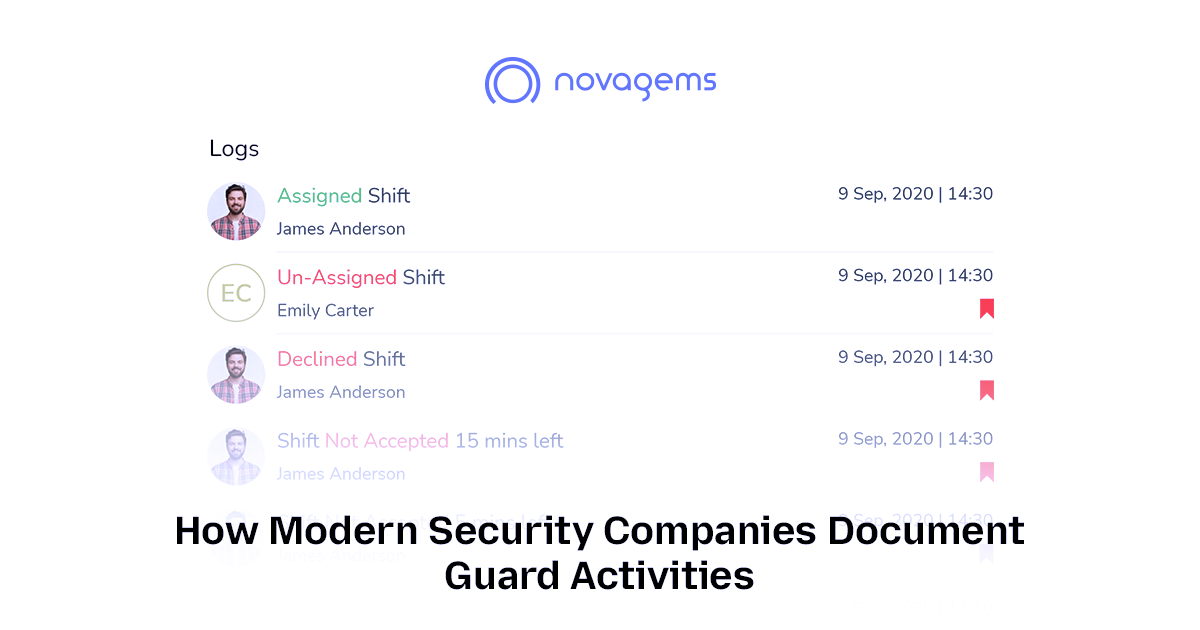Addressing Security Guard Sleeping While on Duty Issues
Published on: Mon, Nov 4, 2024
Read in 8 minutes

Working the night shift as a security guard is no easy task. Unlike daytime shifts, night shifts require guards to stay alert and vigilant for extended periods, often in quiet, isolated, and dimly lit environments. These conditions make it difficult for many guards to remain awake and attentive throughout the night. Furthermore, human biology is naturally designed for sleeping at night, making the task even harder. For many security guards, working against the body’s natural circadian rhythm can lead to various challenges such as fatigue, boredom, and feelings of isolation.
Security guards play a crucial role in maintaining the safety and security of people and properties. Falling asleep during their shift can result in serious consequences. Which Includes security breaches, financial losses, and reputational damage to their employer. This makes it essential for security companies to understand the difficulties guards face during night shifts. Just imagine - a security guard sleeping while on duty. That is not a good idea in the security industry. That is why you need to implement strategies to help them stay alert and effective while on duty.
The Challenges of Night Shifts
Security guards working night shifts face unique challenges compared to their daytime counterparts. These challenges stem largely from the body’s natural tendency to rest during the night, as well as the nature of the night shift environment.
-
Disrupts Natural Sleep Patterns
The human body is biologically programmed to sleep at night. This is due to our circadian rhythm, the internal clock that regulates our sleep-wake cycle. Night shifts go against this natural rhythm, causing guards to feel drowsy, unfocused, and less alert. Even with adequate rest during the day, staying awake during nighttime hours can still be challenging.
-
Isolation and Boredom
Night shifts are often quieter, with fewer people around and less activity. This can lead to a feeling of isolation for security guards, especially if they are patrolling a large area alone. The lack of stimulation and interaction can increase the likelihood of guards becoming bored. Which in turn makes it more difficult to stay alert. With limited activity, the monotony can make guards more susceptible to drowsiness.
-
Fatigue and Mental Exhaustion
Night shifts require guards to maintain focus for long hours, often with minimal physical activity. Constant mental vigilance can lead to exhaustion over time, particularly in jobs where long stretches of inactivity are punctuated by occasional moments of high alertness. This combination can easily lead to fatigue, making it harder for guards to remain focused and attentive throughout the shift.
The Consequences of Security Guards Sleeping on Duty
The consequences of a security guard falling asleep on duty can be severe and far-reaching. When a guard falls asleep, they are unable to perform their primary duty. Which is to protect the people and property under their watch. Here are some of the potential consequences:
-
Increased Security Risks
When a security guard falls asleep, they become incapable of responding to potential threats. Such as theft, vandalism, or unauthorized access. This creates a significant security risk, as the absence of an alert guard can lead to breaches that compromise the safety of the property and individuals being protected. In high-security areas such as banks, hospitals, or industrial facilities, even a brief period of inattention could result in severe damage, theft, or other dangerous outcomes. If you can learn how to prevent security guards from sleeping on duty, then you can prevent the risk of someone breaking in.
-
Reputational Damage for the Security Company
Security companies are trusted to provide reliable and competent guards. A sleeping guard can damage the reputation of both the individual and the company they represent. If a client discovers that a guard has fallen asleep on duty, they may lose confidence in the company’s ability to provide adequate security. This could result in the loss of contracts, negative reviews, and a tarnished reputation in the security industry. In extreme cases, clients may take legal action or seek compensation for any losses incurred due to the guard’s negligence.
-
Legal and Financial Consequences
Security companies may be held legally and financially responsible for any damages that occur as a result of a guard falling asleep on the job. This could include compensation for stolen property, repairs for vandalism, or even liability for any injuries that occur during a security breach. The financial costs associated with such incidents can be substantial, making it crucial for security companies to take preventive measures to ensure guards remain alert at all times.
-
Job Termination and Disciplinary Action
Guards who fall asleep on duty risk losing their jobs. Most security companies have strict policies in place to prevent guards from sleeping while on the clock. Guards caught sleeping may face disciplinary actions such as suspension, termination, or wage deductions. In some cases, they may be blacklisted from future employment in the security industry. These consequences highlight the importance of guards taking their responsibility seriously and doing everything they can to stay awake.
Best Practices for Staying Awake During Night Shifts
Security guards working night shifts can use several strategies to stay alert and focused. By preparing adequately before the shift and taking active measures during the shift, guards can reduce their risk of falling asleep and ensure they fulfill their duties effectively. These tips to keep security guard keep awake at night might be simple. But they sure are effective.
-
Get Enough Sleep Before the Shift
Proper preparation starts before the shift begins. Guards should ensure they get sufficient rest during the day before their night shift. A well-rested guard is more likely to stay awake and alert throughout the shift. It’s important to develop a consistent sleep schedule that allows for adequate rest before each night shift, helping the body adjust to the reversed routine.
-
Stay Active During the Shift
Guards who remain stationary for long periods are more likely to feel sleepy. Staying active is one of the best ways to fight off drowsiness. Guards can take short walks, stretch, or engage in light exercises during their breaks. Walking around the property or performing regular patrols can also help increase blood flow and maintain energy levels. Rotating tasks with fellow guards, if applicable, can also help prevent mental fatigue and keep the mind engaged.
-
Hydrate and Snack Smartly
Dehydration and hunger can contribute to tiredness. Guards should drink water regularly and avoid heavy meals that can lead to sluggishness. Small, healthy snacks such as fruits, nuts, or energy bars can provide an energy boost without causing an energy crash. Sugary snacks and caffeinated drinks, while offering a quick burst of energy, can result in an energy dip later in the shift. Moderation is key.
-
Mental Stimulation
Guards should keep their minds engaged by reviewing security procedures, reading reports, or paying close attention to surveillance cameras. Engaging the senses, such as listening for unusual sounds or observing changes in the environment, can also help maintain alertness. Guards can mentally challenge themselves by staying aware of their surroundings and practicing situational awareness.
Using Technology: Remote Guarding Solutions
Advancements in technology have provided valuable tools to help security guards stay awake and perform their duties more effectively. One of the most effective tools is remote guarding, which involves using technology such as video surveillance, GPS tracking, and AI-driven monitoring systems to provide additional oversight.
-
Real-Time Monitoring
Remote guarding systems allow supervisors to monitor guards in real time. These systems can detect inactivity or unusual patterns, such as a guard remaining still for too long, and alert supervisors if a guard appears to be asleep or inactive.
-
AI and Motion Sensors
AI-powered surveillance systems can analyze video footage to detect potential threats and send real-time alerts to guards. These systems can also monitor for inactivity and trigger alarms or notifications if unusual activity is detected. Motion sensors can further enhance security by detecting when guards are not moving and prompting them to check in.
-
Virtual Supervision
Remote monitoring services provide an extra layer of supervision by overseeing multiple locations simultaneously. These services can assist in monitoring guards during night shifts and ensure that they remain active and alert.
Shifting to Novagems
- Real-Time Monitoring: Novagems provides real-time GPS tracking and monitoring. Which allows supervisors to track the movement of guards during their shifts. If a guard misses his patrol shift, an alert is triggered. Ensuring immediate attention. Also if a guard leaves his designated place, an alert will be sent to the manager.
- Guard Tour System: The platform includes a guard tour system that requires security guards to perform regular checks at designated points. This keeps guards active throughout their shift and reduces the chances of them falling asleep.
- Easy Scheduling: With Novagems’ scheduling feature, security companies can optimize guard shifts to ensure they have adequate rest between duties. This helps prevent fatigue and ensures that guards remain alert.
- Incident Reporting: Novagems allows guards to easily report incidents through the mobile app. Helping them stay engaged and alert by documenting real-time activities during their shifts.
These features are designed to keep security operations running smoothly and ensure that guards stay awake and vigilant. And hence reducing the risks of security breaches due to inattentiveness.
Conclusion
Addressing the issue of security guards falling asleep on duty is crucial for maintaining safety and trust within the security industry. Night shifts are challenging, but with proper preparation security companies can reduce the likelihood of guards falling asleep while on the job.
With the right measures in place, guards will be better equipped to stay awake, alert, and ready to protect the people and properties under their care. And not only security companies. These tips can be used by security guards too. They can learn how to prepare for night shifts as a security guard.
In summary, taking a proactive approach to night shifts is key. Security companies must support their guards with training, proper scheduling, and innovative technology to significantly reduce the risk of security breaches due to guards falling asleep on the job.
Get a Free Trial
Sign up For Newsletter
Latest Blog Posts
Get Started
Start being productive & grow your business
with Novagems





